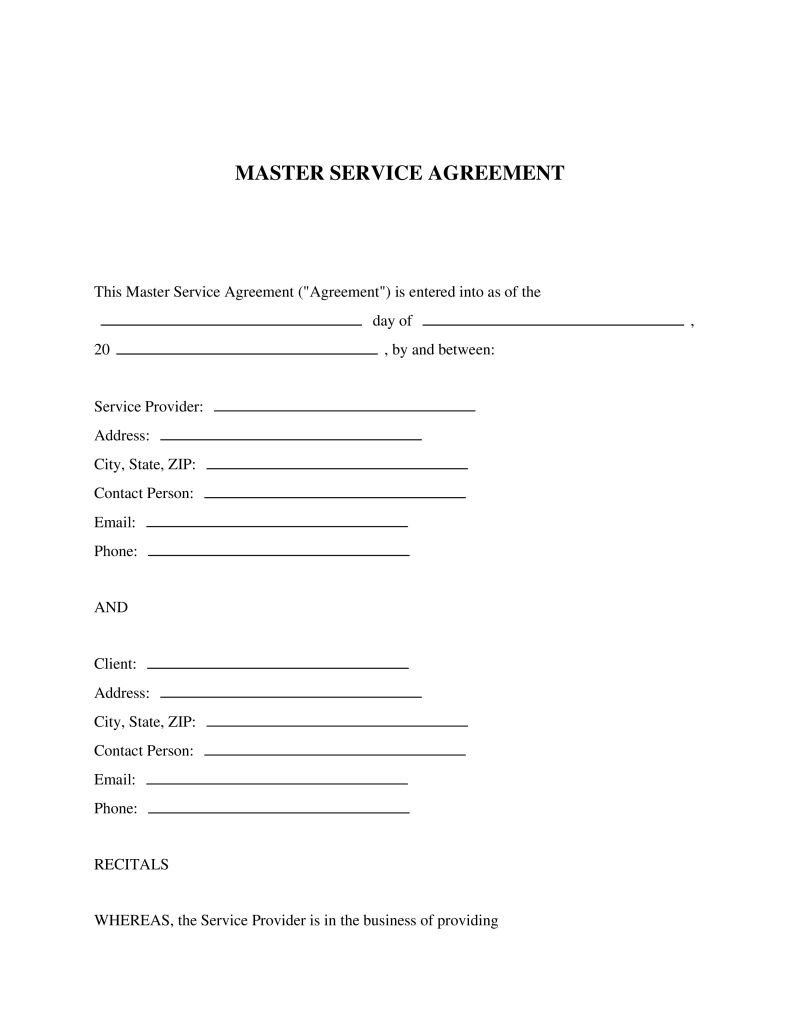A Master Service Agreement outlines terms and conditions for services between parties, establishing a framework for future agreements and projects.
Service Provider Name
Type the full legal name of the Service Provider exactly as it appears in official documents, such as business registration records. This name may include any designations like LLC, Inc., or Corp. Providing the correct name is important, as it ensures the contract is legally binding and enforceable.

Table of Contents
What is a Master Service Agreement?
A Master Service Agreement (MSA) is a contract between two or more parties that establishes the fundamental terms and conditions governing their ongoing business relationship before specific work begins. This framework agreement outlines the general legal provisions, responsibilities, and operational procedures that will apply to all future transactions, projects, or statements of work (SOWs) between the parties. Rather than renegotiating basic terms for each new project, organizations use MSAs to streamline procurement and reduce administrative overhead by pre-establishing key provisions such as payment terms, intellectual property ownership, confidentiality obligations, liability limitations, dispute resolution procedures, and termination conditions.
Key Features
Important Provisions
- Definition of Services: Clearly delineates what services are covered under the agreement, including any limitations or exclusions.
- Payment Terms: Specifies payment schedules, milestones, late fees, and methods of payment accepted by both parties.
- Intellectual Property Rights: Outlines who owns rights to work produced during the engagement, including inventions, designs, and other outputs.
- Termination Clauses: Defines conditions under which either party may terminate the agreement prematurely and any consequences thereof.
- Confidentiality Agreements: Protects sensitive information shared between parties from being disclosed to unauthorized third parties.
Pros and Cons
Pros
- +Saves time and resources by reducing the need for negotiation before each project or service delivery.
- +Minimizes potential disputes through clearly defined terms and conditions applicable to all transactions under the agreement.
- +Enhances operational efficiency by providing a standardized process for ordering services or products.
- +Builds trust and fosters long-term relationships between parties by establishing clear expectations from the start.
- +Offers flexibility to easily accommodate changes in service requirements or project scopes.
Cons
- -May include overly broad or vague terms that could lead to misunderstandings if not carefully tailored to the specific relationship.
- -Requires thorough review and possible revision to ensure it aligns with both parties' current operational practices and legal obligations.
- -Potential for one party to leverage more favorable terms at the outset, impacting future negotiations.
Common Uses
- For ongoing IT services and support agreements between businesses and providers.
- In construction projects, where multiple subcontractors provide various services over time.
- Within the supply chain management context, particularly for regular product purchases or deliveries.
- For consulting services where a consultant offers expertise to a business on an ongoing basis.
- In freelance contracting, particularly in creative fields like design, writing, or software development.
- For maintenance contracts where equipment or facilities require regular upkeep.
Frequently Asked Questions
Do you have a question about a Master Service Agreement?
Example questions:
Not the form you're looking for?
Try our legal document generator to create a custom document
Community Discussion
Share your experience and help others
Legal Notice: Comments are personal opinions and do not constitute legal advice. Always consult a qualified attorney for matters specific to your situation.
Comments (0)
Leave a Comment
No comments yet. Be the first to comment!